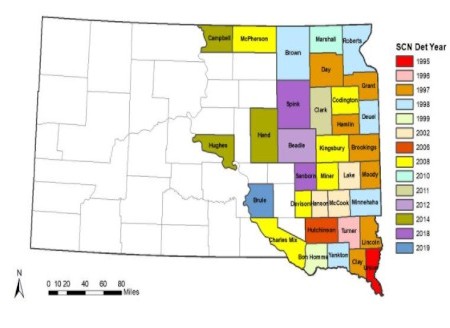By Connie Strunk
Have you noticed lower soybean yielding areas in your field? Soybean cyst nematode (SCN) may be to blame. Soybean cyst nematode is a yield robbing soybean pest in South Dakota silently attacking soybean roots often without showing any obvious above ground symptoms. SCN has been detected in 34 counties as of July 2020 (Figure 1). Fall and especially after soybean harvest is the best time to sample soil and have it tested for SCN. Testing for SCN is free of charge to South Dakota producers courtesy of the South Dakota Soybean Research and Promotion Council.

Figure 1. Current South Dakota counties that have been found with the soybean cyst nematode.
SCN Management
SCN management starts with sampling your soil to determine the presence or absence of this nematode. A positive SCN detection requires adoption of an integrated management approach that includes planting resistant cultivars, crop rotation with non-hosts, and use of nematicide seed treatments especially for fields where SCN egg counts are high (>6,000 eggs/100 cc of soil). A periodic SCN soil test is also needed to monitor the SCN population in the field. An increase in SCN numbers would indicate the methods being used are not working efficiently and therefore would call for change in tactics.
HG Testing
HG (Heterodera glycines, the scientific name for SCN) type testing is recommended for soybean growers who are using SCN resistant cultivars and whose yield is under performing in SCN infested fields. The HG type test indicates which resistance source (PI type) is likely to be effective in limiting reproduction of the SCN on the grown resistant variety. The HG type designation is made up of the numbers of the HG type indicator soybean lines that have elevated SCN reproduction during the greenhouse test. Elevated reproduction means the number of females which formed on an HG type indicator soybean line was greater or equal to 10 percent of the number formed on the susceptible line check.
COMMON QUESTIONS
Where Can HG Type Testing Occur?
The SDSU Plant Diagnostic Clinic offers HG type testing. The SDSU Plant Diagnostic Clinic is located at:
SDSU Plant Diagnostic Clinic
SPSB 153, Box 2108
Jackrabbit Drive
Brookings, SD 57007
Phone: 605-688-5545
What is the Cost for HG Type Testing?
HG type testing is provided as a free service for South Dakota soybean growers. The South Dakota Soybean Research and Promotion Council have provided a grant to underwrite these costs for growers.
What Type of Sample is Needed for HG Type Testing?
Fields which have had high SCN numbers in the past or where low soybean yields are still experienced even when a SCN resistant variety was used should send in a soil and request an HG type test. HG type testing requires slightly more soil, therefore half a gallon should be mailed or dropped at the SDSU Plant Diagnostic Clinic. Guidelines and the SCN submission form can be found in the Soybean Cyst Nematode Soil Sampling Information Sheet.
Source : sdstate.edu